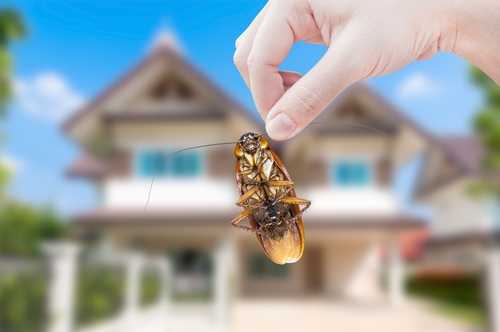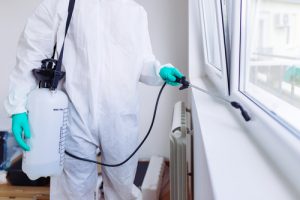

Whether you are a tenant or landlord, dealing with pest control in rentals is essential to maintaining a safe and habitable environment. The problem with pests is while many present a health concern for tenants, they also damage the property itself. So, whether you have vermin infiltrating through unpatched holes or roaches from a lack of proper cleaning, removing the problem is priority number one! That said, tackling these issues raises an important question – who is responsible for pest control in rentals? Join us below as we break down who is responsible for what and under what circumstances to help you avoid disputes.
Who is Responsible for Pest Control in Rentals?
In Virginia, handling pest control in rentals is a joint responsibility between the landlord and tenants. The goal is to take preventative actions so pests do not infest the home. However, if an infestation does occur, quick action is key, especially in multi-family properties.
Under Virginia law, landlords must adhere to all public health and safety regulations along with building codes. In turn, this means addressing pest infestations to preserve habitability even in instances where the tenant is responsible. That said, failing to do so could leave the landlord open to liability.
However, if the tenant is proven to be responsible for the infestation or failed to report the issues promptly, the landlord can seek financial reimbursement for extermination costs.
- Pest Control in Single-Family Units – In single-family homes, the tenant is responsible for pest control in rentals as long as the landlord initially provided a pest-free home and the infestation is not naturally occurring.
- Multi-Family Pest Control in Rentals – When a building has multiple units, landlords are responsible for pest control in rentals. That said, there is an exception when the infestation was a direct result of a tenant’s failure to maintain the premises or report an issue.
Tenant Responsibilities for Pest Control in Rentals
- Immediately report any evidence or suspicion of pests to your landlord
- Keep the property clean and free of food waste
- Remove and store garbage in exterior sealed containers
- Treat pets with evidence of fleas and consider periodic preventative treatment as directed by your vet
- Report any potential entry points to the home’s exterior where pests could get in
- Be vigilant to not bring in pests from other locations or places you visit
Landlord Responsibilities Regarding Pest Control
- Apply pesticides or insecticides in and around the unit as needed to provide tenants with a pest-free home at the start of their lease.
- Comply with all habitability standards and building codes
- React to reports of pests promptly
- Inspect, identify, and repair any vulnerable points of entry
- Communicate with tenants to determine the scope of the issue and coordinate extermination
- Identify and remove the pests using a qualified pest control expert
- Consider seasonal or ongoing preventative treatments
- Provide informative materials to residents on proactive pest prevention

Why is Pest Control Important?
It is the responsibility of the landlord to maintain a habitable property that is safe for tenants. Continue reading below as we discover the potentially harmful effects of not addressing a pest control issue in your rental property.
- Health and Safety – By law, the suspicion or presence of pests must be taken seriously by the landlord. After all, rodents and pests are known to spread diseases, cause respiratory issues, and affect a rental property’s habitability.
- Damages to the Rental Property – Many pests, including termites, rodents, roaches, or ants, pests can cause damage to a rental property. Mice can easily chew holes in walls and even damage electrical wiring. Additionally, it only takes a few days for termites to go from a nuisance to full-blown infestation. So, at the first sign of trouble, reach out to a pest control expert to inspect and treat the issue.
- Complaints and Unfavorable Reviews – In the rental industry, reputation is important. That said, no landlord wants to be known as an owner who risks their tenant’s safety. When residents are not presented with a pest-free home at move-in or the landlord fails to address concerns, tenants can complain, or worse, spread the word online and harm your business.
- Higher Turnover or Vacancy Rates – When landlords fail to prevent infestations or address issues that arise, tenants become unhappy and may even leave, citing safety concerns. Inevitably, this causes lost income and higher vacancy rates for landlords on top of the extermination costs. So, taking steps to prevent reoccurring issues is key to maintaining a profitable rental.
How to Include Pest Control Clauses in a Rental Agreement
A thorough and legal lease agreement is a landlord’s best defense against potential disputes. This document lays out each party’s responsibilities, including who is responsible for pest control in rentals. That said, it is important to research and comply with all applicable laws in your area. So, tailor your lease clause to ensure compliance. However, check out the examples to get you started below. But remember, always have a qualified legal professional familiar with landlord-tenant law review your lease.
Sample Lease Clauses for Pest Control in Rentals
- “Tenant agrees to report any pest issues to Landlord for necessary remediation. It is the Tenant’s responsibility to keep the Dwelling clean; if Tenant consistently lives in an unsanitary environment, Tenant acknowledges and accepts that Landlord is limited in its ability to address the pest situations Tenant waives the right to hold Landlord responsible for continual issues. When inhabiting the Dwelling, the Tenant agrees to inspect the house for fleas, bedbugs, and termites to the best of the Tenant’s ability. Tenant shall notify Landlord before move-in if Tenant has recently lived anywhere that had a bed bug infestation. Landlord may require Tenant to have all furniture or other personal property of Tenant inspected by a pest control specialist prior to move-in at Tenant’s expense. After Tenant has returned the Unit Condition Form, and if Tenant has not made mention of the aforementioned pests, Tenant will be responsible for all costs associated with pest control for the Dwelling. If Landlord confirms the presence or infestation of bed bugs after the Tenant vacates the Dwelling, the Tenant may be responsible for the cost of cleaning and pest control treatments. If the Landlord must move other Neighborhood residents in order to treat adjoining or neighboring dwellings to the Dwelling, Tenant may be liable for payment of any lost rental income and other expenses incurred by Landlord to relocate the neighboring residents and to clean and perform pest control treatments to eradicate infestations in other dwellings.” (Courtesy of Law Insider – https://www.lawinsider.com/clause/pest-control)
- “Landlord provides pest control service if problems with pests arise. Tenant agrees to allow Landlord, without interference, to engage in chemical and mechanical pest control measures within the Premises and the building and grounds wherein the building is located. Landlord makes no guarantee to provide Tenant with alternative housing due to pest control issues as long as the issue is resolved within a reasonable time frame.” (Courtesy of Law Insider – https://www.lawinsider.com/clause/pest-control)
 3 Tips for Preventing Pest Infestations in Rentals
3 Tips for Preventing Pest Infestations in Rentals
As a landlord trying to ward off potential issues, preventative measures are essential. The truth is, providing tenants with a pest-free and safe home is a good business decision, along with being a legal requirement. Unhappy tenants cause an added turnover, lease breaks, poor reviews, and ultimately additional losses for the landlord. Therefore, any steps that can prevent a possible pest infestation are key to success. Check out these 3 helpful tips below –
Regular Inspections
Seasonally inspecting your rental property is important for several reasons. In part, inspecting the home periodically can shed light on unreported maintenance issues, cleanliness concerns, and the presence of pests. This is important because, sadly, not every tenant will report maintenance issues in a timely manner. Typically, one or two inspections per year will suffice. However, always be sure to provide proper notice to your tenants before inspecting the property.
Enlist Professionals
As a landlord, there are many things you can DIY throughout your rental business. However, pest control may not be the best DIY task to take on. Hiring a knowledgeable professional allows you the peace of mind that their experience can identify potential pest vulnerabilities before they become a major problem. Additionally, many pest companies offer regular maintenance contracts to treat pests year-round. Thus, helping to ward off infestations and subsequent damage.
Educate Tenants
Pest control in rentals begins with understanding proper care and recognizing the telltale signs of vermin and pests. Therefore, both landlords and tenants must be on the same page. So, take time to educate tenants on the signs of a pest infestation along with reviewing cleanliness standards for your investment property. Furthermore, encourage tenants to promptly report pest or maintenance issues and remind them they can be held liable for failing to report.
After all, early detection is just as vital as prevention.
The Best Way to Address Pest Control in Rentals
Leaning on the experience of qualified professionals is the best way to manage your rental investment. It is also the best way to handle issues like pest control in rentals or routine preventative maintenance. When it comes to avoiding disputes between landlords and tenants, a thorough and legal lease is the first best step.
At Professional Property Management of Northern Virginia, our team of dedicated property managers in Northern Virginia offers comprehensive rental management services to protect every aspect of your business. This includes marketing, leasing, maintenance, accounting, and top-notch customer service, all for a competitive fee. So, if you are looking for a way to maximize your rental property business, give us a call today for a no-obligation home analysis.


Leave a Reply